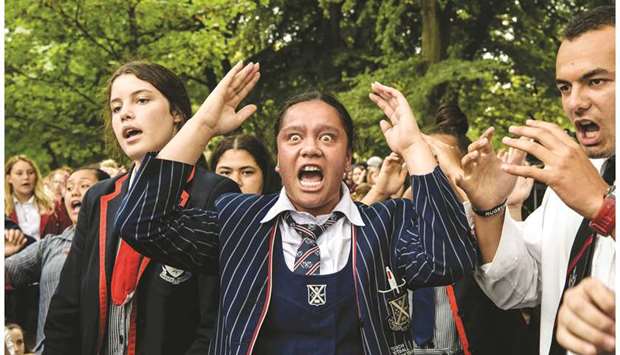New Zealand Prime Minister Jacinda Ardern said yesterday she would announce new gun laws within days, after a lone gunman killed 50 people in mass shootings at two mosques in the city of Christchurch.
“Within 10 days of this horrific act of terrorism we will have announced reforms which will, I believe, make our community safer,” Ardern told a news conference after her cabinet reached in principle decisions on gun reform laws in the wake of New Zealand’s worst ever mass shooting.
In addition to the 50 killed, dozens were wounded at two mosques in the South Island city during Friday prayers. The owner of gun shop Gun City, David Tipple, said the suspected gunman had legally bought four weapons and ammunition online from it between December 2017 and March 2018, but it did not sell him the high-powered weapon used in the massacre.
“The MSSA, military-style automatic, reportedly used by the alleged gunman was not purchased from Gun City. Gun City did not sell him an MSSA, only A-category firearms,” Tipple told a news conference in Christchurch.
Under New Zealand gun laws, A-category weapons can be semi-automatic but limited to seven shots. Live-streamed video of a gunman in one of the mosques showed a semi-automatic weapon with a large magazine. Tipple said he supported Ardern’s decision to reform gun laws as the Christchurch shootings had raised legitimate concerns.
Ardern did not give details on new laws, but has said she supports a ban on semi-automatic weapons following the Christchurch shootings.
Australia introduced some of the world’s toughest gun laws after its worst mass killing, the 1996 Port Arthur massacre in which a lone gunman killed 35 people using a semi-automatic AR-15 – the same weapon used in the Christchurch massacre. Australia banned semi-automatic weapons, launched a gun amnesty in which tens of thousands of weapons were handed in, and made it much tougher to own them.
Ardern encouraged gun owners who were thinking of surrendering their weapons to do so.
“The clear lesson from history around the world is that to make our community safer, the time to act is now,” she said.
“I strongly believe that the vast majority of gun owners in New Zealand will agree with the sentiment that change needs to occur.”
New Zealand’s top online marketplace Trade Me Group said it was halting the sale of semi-automatic weapons in the wake of Friday’s attack.
New Zealand, a country of only 5mn people, has an estimated 1.5mn firearms. Radio New Zealand said in a report based on police data secured through an Official Information Act request, that more than 99% of people who applied for a firearms licence in 2017 were successful.
A New Zealand standard A-category firearm licence is issued after a police and background check. Only firearm owners are licensed, not weapons, so there is no monitoring of how many weapons a person may possess. Still, violent crime is rare in New Zealand and police do not usually carry guns.
Before Friday, New Zealand’s worst mass shooting was in 1990 when a man killed 13 men, women and children in a 24-hour rampage in the seaside village of Aramoana. He was killed by police.
Ardern was the first person to sign a national condolence book that she opened in the capital, Wellington. Frustration was building among the families of victims as under Islam it is custom to conduct burials within 24 hours, but bodies will not be released until post mortems are carried out.
The two mosques involved in the shootings have been closed since the massacre, but are expected to reopen by Friday prayers after cleansing blessings were carried out.
Over the weekend, tens of thousands flocked to memorial vigils around New Zealand and a victim support website raised more than NZ$5.5mn ($3.8mn).

School students perform the hakka during a vigil in Christchurch yesterday.
